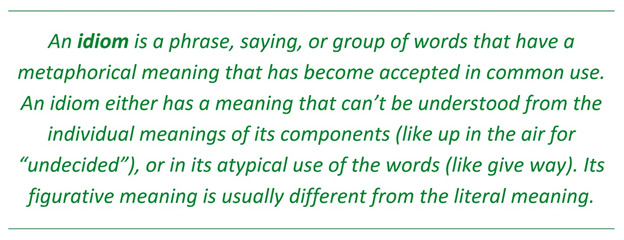Listen to Audio Version:
Professional translators and interpreters face many challenges when doing their jobs. Language, localization, culture, and the situation can all have an impact on the accuracy of the results.
One of the biggest challenges is the idiom. You probably use idioms every day, without even realizing it. But when interpreting or translating from one language to another, idioms can certainly be a fly in the ointment.
Professional translators and interpreters can handle them, and there are ways you can help. But first – what is an idiom?
All cultures have their own idioms; there are thousands of them in each language. The English language alone has at least 25,000! Yet idioms are woven through language so completely that we may not recognize them – perhaps because they keep a low profile.

The Stumbling Block to Understanding Idioms
Idioms can be hard for non-native speakers to understand because the meanings are usually symbolic. Each language has its own expressions that are used without conscious thought but may not be obvious for non-native speakers to understand. It may rain cats and dogs in the United States, but in Norway it may be raining witches, and in the Faroe Islands it may be raining pilot whales. The expressions don’t always make sense, but native speakers know what they mean.
Sometimes the idioms offer advice, like don’t judge a book by its cover. Sometimes they are proverbs that reflect the values of the culture, as in a chain is only as strong as its weakest link. Then there are idioms that are driven by pop culture, like when you feel like you’re king of the world!
Communication Challenges
Interpreting or translating idioms poses a challenge because the uniqueness of the expression could lead to multiple possibilities. One is that the idioms won’t make sense in the target language. Another is that they will make sense – but will not have the intended meaning.
Idioms are usually understood by people who share the same language and culture. Professional translators and interpreters have the knowledge and cultural understanding to spot the idioms and convey the meaning of the expressions. They won’t just sweep them under the rug.
Interpreters have a responsibility to think on their feet and make sure they understand and convey the intended meaning exactly. Imagine traveling to Sweden, and you hear “Att glida in på en räkmacka.” A word-for-word interpretation would be “to slide in on a shrimp sandwich.” However, the intended meaning is “somebody who didn’t have to work to get where they are.”

An interpreter needs to understand the source language and the local culture to be able to interpret idioms accurately on the fly, so you are not looking around for a shrimp sandwich while your colleague is discussing business. Professional interpreters have the skills and experience to handle these expressions.
Translators face similar challenges, minus the pressure of translating on the spur of the moment or providing a face-to-face explanation of idioms. A translator has to apply knowledge of both the native and target language and culture to accurately translate the text. That’s why idioms are one of the reasons that machine translation is limited in its effectiveness. Machine translation is evolving, but it is still relatively restricted to word-for-word substitutions and doesn’t allow for figurative or colloquial meanings. The human translator is able to take those factors into account to provide a quality translation you can trust. Learn more about the risks of machine translation.
How You Can Help
When working with a professional for written translation services, remember that the documents in the source language should be clear and consistent. This includes avoiding idioms, slang, and humor, as they don’t always translate well, or at all. Simplifying your document for translation can make all the difference – and save you money in the long run. See our writing tips for translation for more information.
When it comes to spoken interpretation, the same suggestions apply. Try to avoid using idioms or expressions that are likely to muddy the waters or be difficult to explain. Be aware that puns or jokes may not be culturally appropriate and may go over like a lead balloon. Keep the language simple and straightforward, so the conversation can move forward smoothly.
Language Professionals
With the variety of idioms and expressions specific to cultures and regional areas, it becomes even more obvious that language professionals are needed to bridge the language gap, whether it is for in-person interpretation or reaching new audiences with written translations for global marketing. It takes a mastery of both the native language and the target language to convey the meaning of idioms or expressions; it is not a simple substitution of words in one language for words in another.
You can rest assured that Rapport International provides highly experienced and trained professionals who are familiar with idioms and sayings in their native languages and will hit the nail on the head for all your translating and interpreting needs. Please contact us for a free consultation or quote – we won’t leave you with egg on your face!
Did You Notice?
Did your eagle eye pick out all the idioms in this blog? There are 26 English language idioms mentioned in this article. In this case, take our advice and don’t follow our example – or do as we say, not as we do – and bridging the language gap will be a piece of cake!

Rapport International specializes in multilingual communications, providing language translation and interpretation services that are accurate and culturally appropriate. We use the right voice and the correct terminology to avoid liability, customize services to your needs, and deliver on time and within your budget. With our 100% satisfaction guarantee, you can trust that it’s done right. Contact us today if you would like more information or to get a free quote.
Popular Posts
Popular industry news, interviews, technologies, and resources.
















